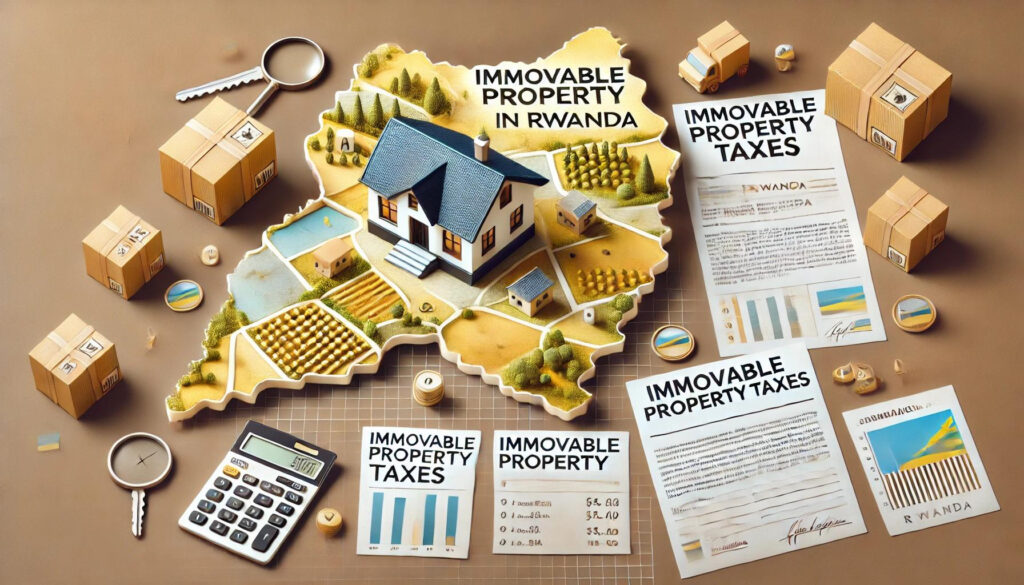
Understanding property taxes is essential for any real estate owner in Rwanda. The Rwandan tax system categorizes taxes into various types, and one of the key categories is immovable property taxes. These taxes specifically relate to real estate, including land and buildings. If you own property in Rwanda, here’s what you need to know about immovable property taxes.
What Is Immovable Property?
In Rwanda, immovable property refers to land, buildings, and other structures that are permanently attached to the land. Immovable property taxes are levied on these types of properties and are crucial for both property owners and potential buyers to understand.
Main Types of Immovable Property Taxes in Rwanda
There are three main types of immovable property taxes that property owners in Rwanda should be aware of:
Land Tax:
- This annual tax is imposed on landowners and is generally calculated based on the size and location of the land.
- Land tax is a fundamental obligation for anyone who owns land, whether for personal, commercial, or agricultural use.https://www.rra.gov.rw/en/district-revenues/immovable-tax-property
Property Tax:
- This tax is assessed on buildings and other structures. The amount varies depending on the property’s value and its intended use (e.g., residential, commercial, or industrial).
- Property tax ensures that those who own valuable structures contribute appropriately to the country’s revenue.
- https://www.rra.gov.rw/en/district-revenues/immovable-tax-property
Transfer Tax:
- Applied when real estate is sold or transferred from one party to another, this tax is crucial during property transactions.
- It’s important to factor in this tax when buying or selling property to avoid unexpected costs.
Immovable Property Tax Base
The base for immovable property tax in Rwanda is determined by various factors:
- Market Value: The market value of a building and the related plot is a primary consideration. Higher market value typically means higher taxes.
- Land Surface: The surface area of land designated for construction or land that is not intended for residential use is also taxed.
- Exempt Properties: Some properties, such as those without basic infrastructure or those belonging to vulnerable persons, may be exempt.
Immovable Property Exemptions
Certain properties are exempt from immovable property taxes. These include:
- Primary Residences: One building intended by the owner to be occupied as a dwelling, along with any annex buildings on a residential plot for one family, is exempt. This applies even if the owner does not currently occupy the property.
- Vulnerable Persons: Immovable properties owned by vulnerable persons, as determined by the district council or the Council of the City of Kigali, are exempt from taxes.
- Government and Diplomatic Properties: Properties owned by the state, decentralized entities, and public institutions are exempt, provided they are not used for profit-making activities. Similarly, properties owned by foreign diplomatic missions are exempt, as long as their home countries do not tax Rwanda’s diplomatic properties.
- Agricultural Land: Land used for agricultural, livestock, or forestry activities up to two hectares is exempt from immovable property tax.https://www.rra.gov.rw/en/district-revenues/immovable-tax-property
Property Tax Rates
- Land Surface: The tax rate ranges from zero to FRW 80 per square meter of land.
- Residential Property: A tax rate of 0.5% of the market value applies to both the building and the related plot of land.
- Commercial Property: The tax rate is 0.3% of the market value for commercial buildings and plots.
- Industrial Property: Industrial buildings and plots, as well as those belonging to micro-enterprises and small businesses, are taxed at 0.1% of their market value.
Special Considerations
There are a few special considerations in determining property tax:
Residential Buildings with Multiple Floors:
- A plot and a building for residential use with three floors are taxed at 0.25% of their market value.
- Buildings with more than three floors are taxed at a reduced rate of 0.1%.
Exclusion of Machinery and Equipment:
- When determining the taxable value of a commercial or industrial building, machinery and other equipment attached to the building are not included.
Understanding these taxes and their implications is crucial for property owners and investors in Rwanda. Whether you’re buying, selling, or simply managing property, being informed about immovable property taxes can help you make better financial decisions and avoid potential pitfalls.

